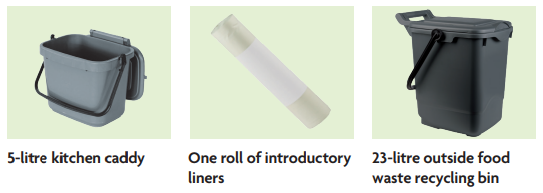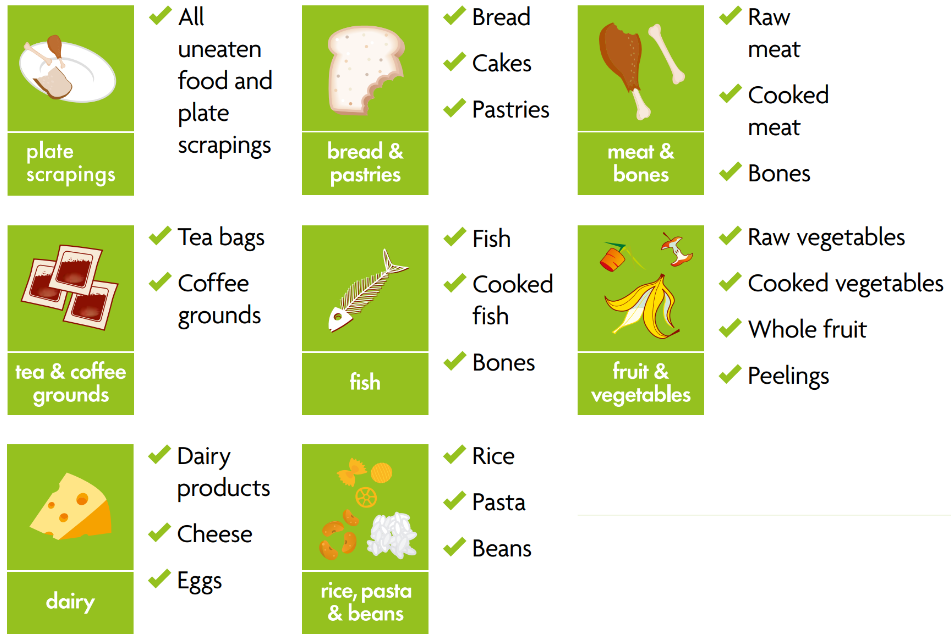About the service
Why are we introducing new weekly food waste recycling collections?
New legislation means that all Councils must collect food waste separately. Nationally 26% of the waste in the average household bin is food waste and organic material.
In Newham this is as high as 40% which generates harmful greenhouse gas emissions and creates a negative environmental impact. This provides us with a great opportunity to start recycling our food waste.
Your food waste will be sent to a local Anaerobic Digestion (AD) plant where it will generate Biogas, a renewable energy source fed directly to the National Grid and nutrient-rich bio-fertiliser to be used on farmland to grow more food.
Did you know that nine recycled banana peels could generate enough energy to fully charge a laptop? Find out more about the benefits of recycling your food waste.
Equipment you will receive:
If you live in a street-level property:

- 5-litre grey indoor kitchen caddy
- One introductory roll of liners
- 23-litre grey outdoor lockable bin
- Information leaflet (PDF) - *Your collection day will vary
If you live in a flat:

- 5-litre grey indoor kitchen caddy
- One introductory roll of liners
- Access to a large grey external shared food waste recycling bin
- Information leaflet (PDF) - *Your collection day will vary
How to use the kitchen caddy:
If you live in home which is street-level, you can find out more information about how to use your caddy and what to recycle, by taking a look at this Information leaflet (PDF)
If you live in a flat, you can find out more information about how to use your caddy and what to recycle, by taking a look at this Information leaflet (PDF)
What can I put in my kitchen caddy?
✅ Yes, please:

You can place any uneaten or unwanted food inside the kitchen caddy such as:
-
Bread and cakes
-
Dairy products (such as cheese and yoghurt)
-
Eggs
-
Fruit and vegetable peelings
-
Pasta and rice
-
Meat and fish (cooked/uncooked, including bones)
-
Out-of-date food
-
Eggshells*
-
Fruit and vegetable peelings*
-
Tea bags and coffee granules*
❌ No, thanks:

-
Any food or drink packaging
-
Flowers
-
Any liquids
Incorrect items placed in the outdoor food waste recycling bin, or the external grey shared food waste recycling bin, may result in the bin not being emptied on the scheduled bin collection day. You will need to remove the incorrect items and re-present the bin for collection next week.
Home Composting
*You can also recycle these items at home by composting, helping you to reduce even more waste.
We offer subsidised compost bins to residents - you can order a compost bin here.
You can apply to start your own Community Compost group here.
For more information on Composting, visit Get composting – Newham Council.
Collection Information: when will the outdoor food waste caddy be collected?
-
For street-level properties, the outdoor food waste caddy is collected every week on the same day as your orange-lidded recycling bin. Please place your caddy at the edge of your property, next to your wheelie bins and as close to the pavement as possible (for example, by your gate or at the end of your drive). Please don’t place your food waste bin on the pavement.
-
For communal properties, the shared food waste bin will be collected every week on the same day as your orange lidded recycling bin/s.
You can find your bin collection days through the ‘My Account’ Sign up or sign in here.
Journey of the food waste that is collected
Your food waste is taken to a local Anaerobic Digestion (AD) plant. The process produces renewable biogas, which is fed directly into the National Grid, and nutrient-rich biofertiliser that is used on farmland.
